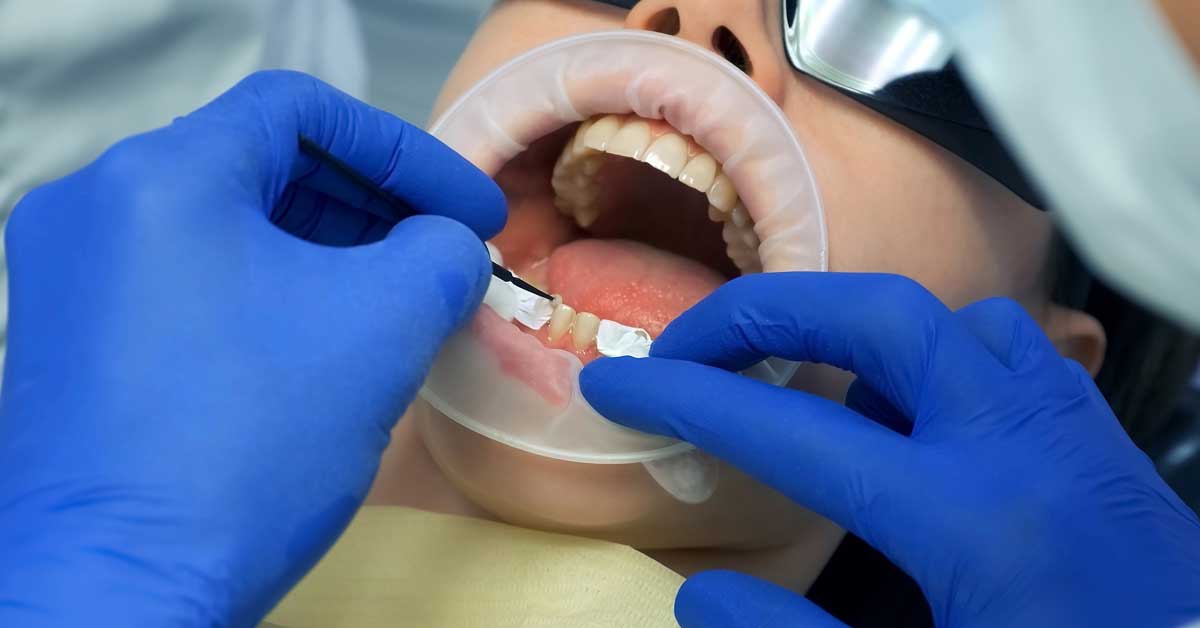Are Veneers Painful to Get?
Dental veneers are a popular choice for transforming the appearance of teeth, helping to address issues such as tooth spacing, crooked teeth, and discoloration. But what about the discomfort associated with getting veneers? Are veneer procedures painful? Let’s uncover the truth!
A person sitting in a dentist’s chair with their mouth open wide, looking uncomfortable as the dentist applies veneers to their teeth. The person’s hand is clenched tightly on the armrest, and there are beads of sweat on their forehead.
The dentist’s gloved hands are visible, holding dental tools and a tray of veneers. The room is bright and sterile-looking, with white walls and bright overhead lights.
Key Highlights
-
Most patients experience little to no pain during the veneer procedure.
-
Discomfort, if any, can be managed with over-the-counter medications.
-
Proper oral care instructions after getting veneers are crucial for maintaining their longevity.
-
Temporary post-operative sensitivity to hot and cold sensations may occur but can be managed with over-the-counter pain relief.
-
Consulting with a dental professional can help address any concerns or anxiety for a more comfortable experience.
Do Veneers Hurt?
The process of getting veneers is generally not painful. Most patients with two to four veneers experience little to no pain after the procedure, and those with eight or more may feel mild soreness in the gums and jaw, which can be relieved with over-the-counter medications.
The placement of veneers is a simple and painless process, and any discomfort is manageable with over-the-counter medications. Additionally, some patients may feel slight discomfort when the tooth enamel is being prepared, but this is typically minimized with local anesthesia.
Therefore, while there may be some minor soreness or discomfort associated with the procedure, the overall consensus is that veneers are not painful to get.
Types of Veneers and Procedures
When considering veneers, it’s essential to understand the different types available and the procedures involved. This section will provide you with insights into porcelain veneers, composite resin veneers, and no-prep veneers, as well as the steps taken during the veneer application process.
Porcelain Veneers
Porcelain veneers are highly sought after for their exceptional quality and natural appearance. They are crafted from durable porcelain material and are custom-made to fit your teeth perfectly.
These veneers require tooth preparation, where a thin layer of enamel is removed from the teeth to make room for the veneers. This step ensures optimal bonding and a seamless aesthetic. Porcelain veneers provide excellent longevity and deliver stunning results.
Composite Resin Veneers
Composite resin veneers offer a more affordable option compared to porcelain veneers. Made from a tooth-colored composite material, these veneers are applied directly to the teeth and can be shaped and polished to match your desired aesthetic.
While composite resin veneers may not be as durable as porcelain, they can still provide a significant enhancement to your smile.
No-Prep Veneers
If you’re seeking a minimally invasive option, no-prep veneers may be suitable for you. One popular brand of no-prep veneers is Lumineers. These veneers are ultra-thin and require minimal tooth preparation, often eliminating the need for enamel removal.
They offer a conservative approach to enhancing your smile and are reversible if desired.
The Veneer Application Process
The process of getting veneers typically involves the following steps:
-
Tooth Preparation: A small amount of enamel is trimmed off the teeth to create space for the veneers.
-
Impressions: Impressions of the prepared teeth are taken to create custom veneers.
-
Bonding: The veneers are carefully bonded to the teeth using dental adhesive.
-
Final Adjustments: Any necessary adjustments are made to ensure proper fit and alignment.
During the veneer procedure, some patients may experience mild discomfort or sensitivity. To minimize any potential discomfort, sedation options are available.
Dentists can provide sedation dentistry to help you relax and alleviate any anxiety during the procedure.
Pain Management and Recovery
After getting veneers, it is important to follow proper recovery guidelines for optimal healing. Patients may experience some gum discomfort and mild soreness in the jaw, especially if they have received a larger number of veneers.
Over-the-counter pain medications can help alleviate any discomfort. It is crucial to maintain good oral hygiene by brushing and flossing regularly, paying special attention to the areas where the veneers meet the gum.
Regular dental cleanings and check-ups should be scheduled twice a year. There may be temporary post-operative sensitivity to hot and cold sensations due to the thinning of enamel, but this discomfort is usually mild and can be managed with over-the-counter pain relievers.
Pain Management Tips After Getting Veneers:
-
Take over-the-counter pain medications such as ibuprofen or acetaminophen to alleviate gum discomfort and jaw soreness.
-
Follow proper oral hygiene practices by brushing and flossing regularly, paying extra attention to the areas where the veneers meet the gum.
-
Schedule regular dental cleanings and check-ups to ensure the longevity and health of your veneers.
-
Expect temporary post-operative sensitivity to hot and cold sensations. This discomfort is usually mild and can be managed with over-the-counter pain relievers.
By following these pain management tips and maintaining good oral hygiene, you can ensure a smooth recovery process and enjoy the benefits of your new veneers.
Over-the-Counter Pain Medications for Veneer Procedure Pain Relief
| Pain Medication | Recommended Dosage | Advantages |
|---|---|---|
| Acetaminophen (Tylenol) | 500-1000 mg every 4-6 hours |
|
| Ibuprofen (Advil, Motrin) | 200-400 mg every 4-6 hours |
|
| Naproxen (Aleve) | 220 mg every 8-12 hours |
|
Different Types of Veneer Materials and Costs
Veneers can be made from two primary materials: porcelain and composite resin. Each material has its own set of characteristics and cost considerations.
Porcelain veneers are known for their durability, natural appearance, and stain resistance. On the other hand, composite veneers are more affordable but may not last as long as porcelain veneers. Choosing the right material for your veneers depends on your budget and desired outcome.
Porcelain veneers are considered the gold standard due to their high aesthetic appeal and longevity. They are custom-made in a dental laboratory using impressions of your teeth.
Their color can be matched to your natural teeth, creating a seamless blend. Porcelain veneers typically cost between $500 and $2,500 per tooth, depending on factors such as the dentist’s location and the number of veneers required.
Composite resin veneers are a more cost-effective option. They are applied directly to the teeth in layers and shaped to achieve the desired appearance. The color can be adjusted to match your natural teeth, providing a natural-looking result.
Composite veneers are priced between $250 and $1,500 per tooth, making them more affordable than porcelain veneers.
Here is a comparison of the two types of veneers:
| Veneer Material | Aesthetic Appeal | Durability | Stain Resistance | Cost (Per Tooth) |
|---|---|---|---|---|
| Porcelain | High | Very durable | Highly resistant | $500 – $2,500 |
| Composite Resin | Natural-looking | Less durable | Susceptible to staining | $250 – $1,500 |
When considering veneers, it is important to consult with a dentist who can evaluate your individual needs and determine the best material and cost that aligns with your goals.
Keep in mind that the cost may vary based on the complexity of the case and additional treatments required before the veneers can be placed.
Veneers vs. Other Cosmetic Dentistry Options
When it comes to improving the appearance of your teeth, veneers are just one of the options available. Dental bonding is a less expensive alternative that can fix imperfections by adhering tooth-colored material directly to the tooth.
Additionally, there are other cosmetic dentistry procedures to consider, such as teeth whitening, orthodontics, and dental implants, depending on your specific dental issues.
To determine the best treatment plan, it is crucial to undergo a thorough dental examination, which may include a dental X-ray and impressions. Consulting with a dental professional, such as an oral hygienist or cosmetic dentist, can help guide you in choosing the most suitable option for your desired results.
Here is a comparison of veneers with other cosmetic dentistry options:
| Veneers | Dental Bonding | Teeth Whitening | Orthodontics | Dental Implants |
|---|---|---|---|---|
| Custom-made thin shells bonded to the front of teeth | Direct application of tooth-colored material to fix imperfections | Whitening agents applied to lighten tooth color | Braces or aligners to straighten teeth | Surgical insertion of artificial tooth roots |
| Durable and long-lasting | Less expensive | Non-invasive | Corrects misalignment | Replaces missing teeth |
| Requires enamel removal | Can be completed in a single visit | May cause temporary tooth sensitivity | Gradual process over months or years | Requires healing time after surgery |
Ultimately, the choice between veneers and other cosmetic dentistry options depends on your specific dental needs, budget, and desired outcome. A thorough consultation with a dental professional will provide the guidance needed to make an informed decision.
Conclusion
The decision to get veneers should be made after careful consideration and consultation with a dental health professional. Veneers are an excellent option for enhancing the appearance of your teeth and achieving a beautiful, confident smile.
While some patients may experience mild soreness or discomfort during and after the veneer procedure, effective pain management techniques, such as oral pain relief products, can help alleviate any unpleasant sensations.
After getting veneers, it is essential to follow proper post-operative care instructions to ensure the long-term success of your veneers. This includes maintaining good oral hygiene by brushing and flossing regularly and using dental care products recommended by your dentist.
Additionally, attending regular dental check-ups is crucial for monitoring the condition of your veneers and addressing any concerns or issues.
Frequently Asked Questions
It is normal to experience some gum discomfort and mild soreness after getting veneers. Over-the-counter pain medications can help alleviate any discomfort. It is important to follow proper oral care instructions, including brushing and flossing regularly, to maintain the longevity of the veneers.
Veneers can be made from either porcelain or composite resin materials. Porcelain veneers are known for their aesthetic appeal and durability, while composite veneers are more affordable but less long-lasting. The cost of veneers can vary depending on factors like the dentist’s location and the type of veneer chosen.
Healing time after veneer application can vary, but most patients experience a full recovery within a week or two. It is important to have realistic expectations and communicate any concerns or anxiety to the dentist. Various techniques can be used to reduce pain during the procedure, and sedation options are available for those who require them.
Veneers are just one option for improving the appearance of teeth. Dental bonding, teeth whitening, orthodontics, and dental implants are other options to consider depending on specific dental issues. It is important to consult with a dental professional to determine the best treatment plan.
Proper recovery guidelines should be followed for optimal healing after getting veneers. This includes maintaining good oral hygiene, attending regular dental check-ups, and using dental care products recommended by the dentist. Post-operative discomfort can be managed with oral pain relief medications.
Veneers In Miami, FL
Don’t wait any longer to achieve the smile you’ve always wanted. Schedule a consultation with our cosmetic dentistry experts today and discover how Veneers can transform your appearance and enhance your confidence.






